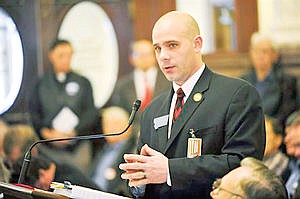Bill to allocate funds for long-term clean-up
The Montana State Senate recently passed a bill reallocating a portion of the state mine license tax revenue to a fund established to help bear the cost of environmental clean-up in Libby. The bill, Senate Bill 20, was sponsored by Sen. Chas Vincent of Libby and passed the Senate unanimously March 31.
The bill also sends an additional 10 percent of the mines license tax back to the 11 counties considered to be “hard-rock” counties, or counties in which hard-rock mines operate. Lincoln County is one of the 11 to receive a financial bump from the bill.
“These funds help alleviate costs for essential services, which in turn reduces the tax burden on the citizens of the counties,” Vincent said.
The State of Montana collects $10 million annually in mine license taxes. Vincent’s bill will result in an additional $1 million per year being divided among the 11 counties with operating hard-rock metal mines. Because the disbursement of this revenue is delayed by 16 months, Vincent said, Lincoln County will still receive some of the money even though the Troy Mine is going into closure and reclamation status.
The primary driving force of the bill, Vincent said, was to find a way to fund the ongoing operation and maintenance phase of the Libby Superfund site.
The Environmental Protection Agency is expected to release a draft remediation plan in either May or June of this year, if the schedule isn’t pushed back once again. Based upon the number of properties remaining to be inspected and cleaned in the area, the active work is expected to conclude within the next three to five years.
Once the active work is complete, the site will transition to long-term operation and maintenance, which ends the agency’s financial responsibility. Exactly what the long-term costs are, and who pays them, is still a matter of much discussion between local and state officials and the agency.
Vincent said he’s heard estimates of up to $1 million per year for the ongoing costs. Lincoln County Asbestos Resource Program manager Nick Raines said he couldn’t be specific about the costs, as the actual plan hasn’t been released.
“The long-term operation and maintenance costs are still very, very undetermined at this point. We’re still fleshing that out in discussions with the Environmental Protection Agency and the state,” said Raines.
Raines said the Lincoln County Asbestos Resource Program, which is currently fully funded by a grant from the EPA, runs slightly more than $400,000 per year. The grant is scheduled to end in December 2016, but Raines said the county is in the process of negotiating an extension with the agency to keep the funding flowing through the end of the active clean-up phase.
Under current law, $1.2 million from the mines license tax each year goes into the Zortman-Landusky fund, a fund dedicated to cleaning up water contamination at a legacy mine site. The fund requires a principal balance of $19.3 million in order for the interest generated to be able to fully fund operations. Once the Zortman-Landusky fund reaches the $19.3 million target, SB20 will divert $600,000 into an account for operations and maintenance in Libby.
“It creates a long-term solution that will offset, at least partially, the operation and maintenance costs of those living inside the Superfund area,” Vincent said.
The Zortman-Landusky fund will be fully funded in January 2018. The funding for the Libby operations and maintenance will begin at the start of the next fiscal year, which is July 1, 2018, Vincent said.
The bankruptcy settlement between the Environmental Protection Agency and W.R. Grace and Co. set aside roughly $11 million for the long-term operations and maintenance of the site. Those funds, however, won’t last very long and then the responsibility will shift to either the state or the county.
Lincoln County, with the highest unemployment rate in the state and one of the highest in the nation, is not financially able to bear the burden of long-term operations and maintenance for the site.
How the costs are to be distributed is a topic under discussion between the Environmental Protection Agency, the Montana Department of Environmental Quality and Lincoln County, including the Asbestos Resource Program. The uncertainty surrounding both the amount and the source of the funds needed to maintain the integrity of the agency’s active clean-up has created a great deal of concern from both private citizens and elected officials.
Vincent said the bill will help address some of the uncertainty surrounding the long-term cost and the financial responsibility.
“This is long-term, sustainable and predictable revenue to fund the operation and maintenance phase of the clean-up,” Vincent said.

